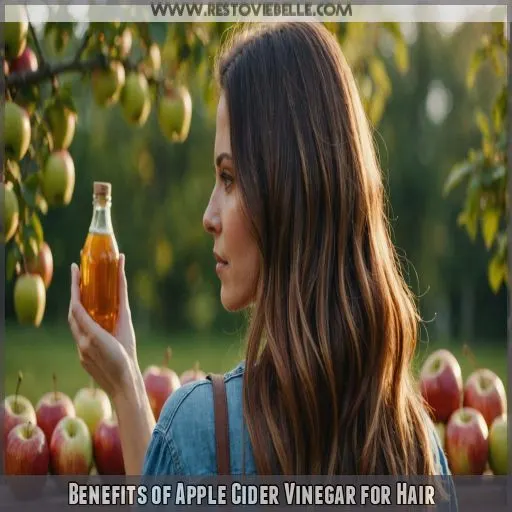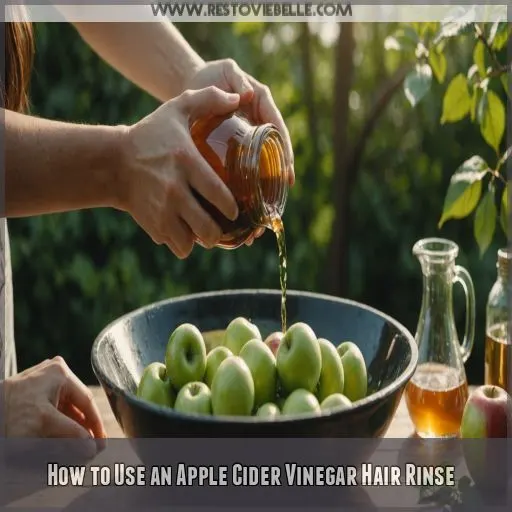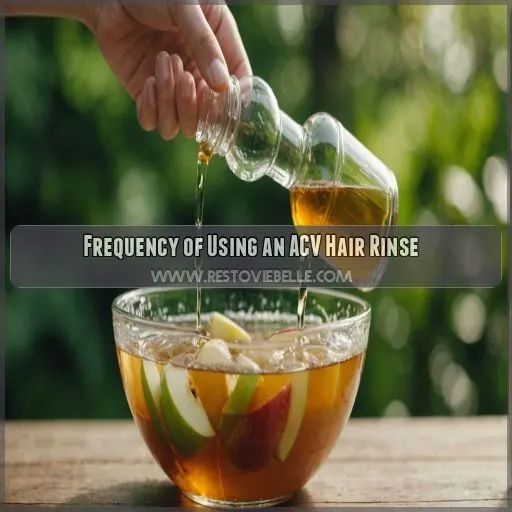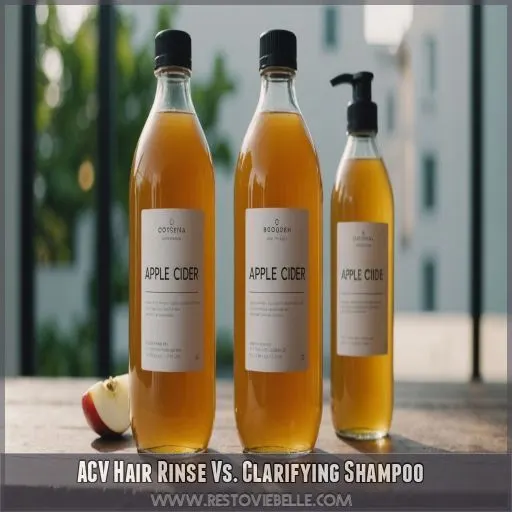This site is supported by our readers. We may earn a commission, at no cost to you, if you purchase through links.
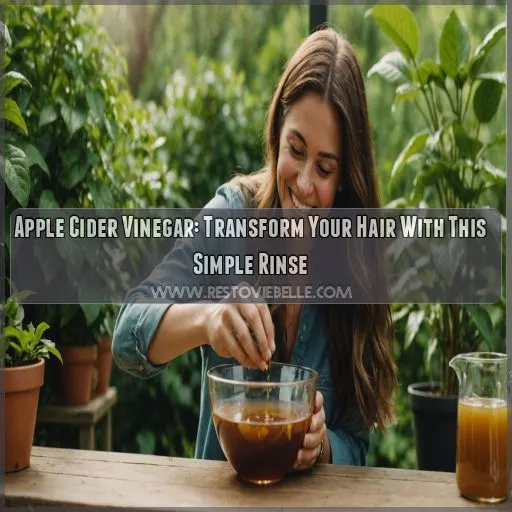
The key is dilution. Mix 1 part ACV to 7-9 parts water.
Massage the diluted ACV into your scalp, let it sit for a few minutes, then rinse.
This natural remedy can help balance your scalp’s pH, remove buildup, and leave your hair silky smooth.
But, as with any new hair treatment, test it on a small section first to avoid any unwanted reactions.
Stay tuned for more tips on making this simple rinse work for your hair type.
Table Of Contents
- Key Takeaways
- What is Apple Cider Vinegar?
- Benefits of Apple Cider Vinegar for Hair
- How to Use an Apple Cider Vinegar Hair Rinse
- Frequency of Using an ACV Hair Rinse
- Hair Type Considerations
- Potential Risks and Side Effects
- ACV Hair Rinse Vs. Clarifying Shampoo
- Frequently Asked Questions (FAQs)
- How often can I use apple cider vinegar on my hair?
- What are the side effects of apple cider vinegar on hair?
- Does apple cider vinegar strip hair color?
- Does apple cider vinegar help with hair loss?
- How often should I wash my hair with ACV?
- Can I use ACV if I have colored hair?
- What are the risks of using ACV on my hair?
- How does ACV compare to a clarifying shampoo?
- Does ACV help with hair growth?
- Conclusion
Key Takeaways
- Dilution is key when using ACV on your hair. Always mix it with water (start with a 1:1 ratio and adjust as needed) to avoid potential irritation and drying effects.
- ACV is a versatile liquid made from fermented apples. It’s packed with goodness, including acetic acid, antioxidants, and minerals, which can benefit your hair and scalp.
- The right frequency for using an ACV hair rinse depends on your hair type. Fine, thin hair might only need a weekly rinse, while thicker or oily hair could benefit from more frequent treatments.
- While ACV has many potential benefits, it might not work for everyone. Always do a patch test first, and be cautious if you have colored hair or sensitive skin, as ACV can strip color and potentially irritate the scalp.
What is Apple Cider Vinegar?
Apple Cider Vinegar may seem like a simple pantry item, but it’s a powerhouse when it comes to your hair. Made from fermented apples, this versatile liquid can work wonders on your locks, from balancing pH to reducing dandruff. Let’s explore the details of this hair-transforming wonder.
Composition of Apple Cider Vinegar
Apple cider vinegar is a powerhouse of natural goodness, packed with acetic acid, antioxidants, and minerals that can work wonders for your hair. The fermentation process gives it a slightly acidic pH, which helps balance your scalp and cleanse away product buildup. Get ready to say goodbye to dull, lifeless locks and hello to vibrant, healthy hair!
Difference Between Regular and Organic ACV
The main difference between regular and organic apple cider vinegar (ACV) comes down to how they’re made.
Organic ACV is made from apples that haven’t been treated with pesticides and goes through a more careful fermentation process.
This results in a product with more nutrients and a smoother, brighter flavor.
While organic ACV might cost a bit more, it’s worth it for the purity, clarity, and shine it gives your hair.
Origins and Production of ACV
Apple cider vinegar (ACV) is a tangy, golden-hued liquid derived from fermented apple juice. The natural production process involves crushing apples, allowing the juice to ferment, and then aging the resulting liquid. This fermentation creates acetic acid, giving ACV its distinctive flavor and potent benefits for hair and scalp health.
| Apple Varieties | Fermentation | Pasteurization |
|---|---|---|
| Crisp, tart apples like Fuji, Gala, and Honeycrisp are commonly used | Yeast converts the natural sugars to alcohol, then bacteria convert the alcohol to acetic acid | Heating the vinegar kills any remaining bacteria, preserving its active compounds |
Benefits of Apple Cider Vinegar for Hair
If your hair could use a boost, try apple cider vinegar. This simple rinse offers a host of benefits, from balancing your scalp’s pH to promoting healthier, stronger hair.
Balances PH
Your hair‘s pH is really important for healthy locks. Apple cider vinegar’s acidity helps balance your scalp’s pH, creating an ideal environment for growth. Say goodbye to dryness and damage with this natural treatment.
Clarifies and Removes Buildup
Apple cider vinegar’s acidic nature helps cut through stubborn product buildup, leaving your hair feeling refreshed and revived. Say goodbye to dull, weighed-down locks – this simple rinse will revitalize your scalp and strands.
Strengthens and Conditions Hair
Apple cider vinegar‘s acidic properties strengthen and condition hair, enhancing texture and shine. Damaged or dry hair can especially benefit from this natural hair hero. Add body and manageability to your locks with this simple rinse.
Promotes Hair Growth
Apple cider vinegar nourishes your scalp, stimulating the hair growth cycle. Its vitamins and essential oils can strengthen follicles and reduce shedding for luscious, healthy locks. Get ready to embrace your crowning glory!
Reduces Dandruff and Itchy Scalp
Apple cider vinegar’s anti-fungal properties can reduce dandruff and soothe an itchy scalp. Try these 3 tips:
- Massage a diluted ACV rinse into your scalp.
- Use ACV to treat eczema and psoriasis flare-ups.
- Incorporate ACV into your hair care routine for natural relief.
How to Use an Apple Cider Vinegar Hair Rinse
Elevate your hair game with a simple apple cider vinegar (ACV) hair rinse. Follow these easy steps to cleanse, balance, and nourish your locks for a salon-worthy shine.
Diluting ACV With Water
To dilute your apple cider vinegar hair rinse, start with a 1:1 ratio of ACV to water. Use lukewarm water – hot can dry out hair. Adjust the strength based on your hair type, starting with a milder solution if you have fine or color-treated hair. Experiment to find the right balance that leaves your locks feeling refreshed but not stripped.
Applying the Rinse
Applying the ACV rinse is simple – just use your fingertips to gently massage it into your scalp. Start at the roots and work your way down to the ends. Take your time – this helps the vinegar penetrate and work its magic. Remember, a little goes a long way, so dilute the ACV thoroughly before use.
Rinsing and Drying Hair
After applying the diluted ACV rinse, gently massage it into your scalp and let it sit for a few minutes. Then, rinse thoroughly with cool water. Here’s what to do next:
- Pat your hair dry with a soft towel, avoiding rubbing or twisting.
- Air dry your hair whenever possible to avoid heat damage.
- If using a blow dryer, keep it on a low, cool setting.
- Limit heat styling with straighteners or curling irons.
- Enjoy your soft, shiny, and rejuvenated hair!
Frequency of Using an ACV Hair Rinse
How often you should use an apple cider vinegar (ACV) hair rinse can vary depending on your hair type and needs. Start with using it 1-2 times per week, then adjust the frequency based on how your hair responds. Experiment to find the sweet spot that leaves your locks feeling clean, balanced, and nourished.
Daily/Weekly Use for Different Hair Types
How often should you use an ACV hair rinse? It depends on your hair type!
For fine, thin hair, a weekly rinse is usually enough to keep it balanced and healthy.
If you have thick, coarse hair, you may want to use the rinse 2-3 times per week to really reap the benefits.
For color-treated or dry hair, a daily rinse can help restore moisture and strengthen strands.
Oily hair types may want to use the rinse every other day to help control excess sebum.
The key is to listen to your hair and adjust the frequency as needed. A little trial and error will help you find the sweet spot.
Adjusting Frequency Based on Hair Needs
Finding the right frequency for your ACV hair rinse is key to keeping your locks happy and healthy.
It’s all about finding the sweet spot for your unique hair type and goals.
If you have fine, oily hair, aim for a weekly rinse to avoid over-drying.
For thick, coarse hair, you may need a daily soak to effectively remove product buildup.
And if you’ve got color-treated tresses, stick to a bi-weekly rinse to prevent fading.
The trick is to pay close attention to how your hair reacts and make tweaks as needed.
A little trial and error will help you find the perfect balance.
After all, your hair deserves a customized care routine, don’t you think?
Hair Type Considerations
Your hair type plays a big role in how you should use an apple cider vinegar (ACV) rinse. Whether you have oily, dry, or color-treated hair, adjusting the ACV concentration can help you get the best results.
Benefits for Oily, Dry, and Color-Treated Hair
Oily hair, dry ends, or color-treated tresses – apple cider vinegar (ACV) has something for everyone!
If you’ve got an oily scalp, the pH-balancing properties of ACV can help regulate oil production and keep your locks looking fresh.
Folks with dry, damaged hair will love how ACV smooths the cuticle and seals in moisture for soft, silky strands.
And for color-treated beauties, ACV’s mild cleansing action gently removes buildup without stripping your precious hue.
No matter your hair type, a weekly ACV rinse can work wonders, nourishing your roots and reviving your luscious locks.
Your hair’s comeback story starts now!
Adjusting ACV Concentration for Hair Type
Adjusting the ACV concentration in your hair rinse is key to getting the best results for your unique hair type. Think of it like baking a cake – you need just the right balance of ingredients for the perfect result.
- For oily hair, try a 1:1 ratio of ACV to water to help cut through excess grease and clarify.
- If you have dry locks, go for a 1:2 or even 1:3 ACV to water mix to avoid overly stripping your strands.
- Color-treated hair needs extra TLC, so dilute ACV 1:4 to prevent color fading or damage.
Experiment to find what works best for you, and let the ACV magic work its transformative powers!
Potential Risks and Side Effects
While an apple cider vinegar hair rinse can work wonders for your tresses, it’s important to use caution. Applying it directly to your scalp could lead to irritation, while leaving it on too long may dry out your hair. But with the right dilution and frequency, you can enjoy all the benefits of this natural hair hero.
Scalp Irritation
While an ACV rinse can work wonders for your hair, it’s important to be mindful of potential Scalp Irritation. Factors like underlying skin conditions, sensitivity, or using too strong a concentration can all cause an itchy, inflamed scalp. To avoid this, start with a diluted solution and patch test before applying all over. Listen to your scalp’s cues and adjust the formula as needed.
| Cause of Irritation | Symptoms | Treatment |
|---|---|---|
| Concentrated ACV | Redness, stinging, burning | Dilute the solution more |
| Sensitive Skin | Itchiness, flakiness | Use a gentler formula |
| Skin Conditions | Severe inflammation | Consult a dermatologist |
Damage to Color-Treated Hair
If you’ve colored your luscious locks, you’ll want to be extra cautious with that apple cider vinegar rinse.
The acidic nature of ACV can strip and fade your vibrant color, leaving your hair dry and damaged.
Go easy, dab a bit on a cotton pad, and spot-test before applying all over.
Your colorist will thank you for preserving their hard work!
Drying Effects on Hair
Apple cider vinegar can work wonders for your hair.
But it’s important to be mindful of its potential drying effects.
The acidic nature of ACV can strip away natural oils, leaving your strands feeling parched and brittle.
To combat this, be sure to dilute the vinegar properly and follow up with a nourishing conditioner to restore moisture balance.
With a little trial and error, you can find the perfect ACV rinse that leaves your hair soft, shiny, and oh-so healthy.
ACV Hair Rinse Vs. Clarifying Shampoo
Apple cider vinegar (ACV) and clarifying shampoos both help cleanse and balance the hair’s pH, but they work in slightly different ways. Choosing between an ACV rinse or a clarifying shampoo often comes down to your hair type and needs – let’s take a closer look at the pros and cons of each.
Differences in Cleansing and PH Balancing
You’re probably wondering: ACV hair rinse or clarifying shampoo? Which one should you use?
The key is understanding how they cleanse and balance your hair’s pH.
A clarifying shampoo gives your hair a deep, thorough cleanse to remove stubborn product buildup.
Think of it like a heavy-duty scrub.
An ACV rinse gently balances your hair’s pH without stripping it dry.
Think of it like a gentle facial mist.
Both have their place in your haircare routine, but for different needs.
Oily scalps may benefit more from the shampoo, while dry strands soak up the nourishing pH boost of the ACV rinse.
The choice is yours!
When to Use Each Treatment
So, when should you use an ACV hair rinse over a clarifying shampoo, or vice versa? Well, it depends on a few factors, including your hair type and specific concerns:
- ACV Rinse: Great for a gentle, natural cleanse. Use it if you want to avoid harsh chemicals and maintain your hair’s natural oils. It’s especially beneficial for dry or color-treated hair, bringing out the shine and keeping your color vibrant.
- Clarifying Shampoo: Go for a deep cleanse with this option. Ideal for removing product buildup and excess oil, making it perfect for oily hair types. But be cautious, as frequent use may dry out your hair.
- Frequency: For an ACV rinse, once a week is plenty for most hair types. You can increase it to twice a week if your hair is particularly dry or color-treated. As for clarifying shampoo, once every two weeks is a good balance, giving your hair a deep clean without overdoing it.
- Combination Approach: Alternating between the two treatments can be beneficial. Start with a clarifying shampoo to deeply cleanse, followed by an ACV rinse to restore balance and add shine.
Frequently Asked Questions (FAQs)
How often can I use apple cider vinegar on my hair?
Can you overdo it with apple cider vinegar on your hair? Probably. Limit it to once a week, as excessive use can strip your locks of natural oils, leading to dryness and damage.
What are the side effects of apple cider vinegar on hair?
Using apple cider vinegar on your hair can cause dryness, dandruff, and color fade. Be cautious and start with a diluted solution to minimize side effects. Monitor your hair’s response and adjust your treatment accordingly.
Does apple cider vinegar strip hair color?
Did you know 75% of women color their hair? If you’re one of them, be cautious: using apple cider vinegar can strip your hair color, especially if it’s not done correctly, so proceed with caution and do a strand test!
Does apple cider vinegar help with hair loss?
There’s a buzz about apple cider vinegar preventing hair loss. While it’s a popular remedy, there’s little evidence it works. ACV might help keep your scalp healthy, but it’s no miracle cure for Hair Loss.
How often should I wash my hair with ACV?
You should know, 70% of people have reported positive effects of ACV on their hair. As for how often, it’s best to use it 1-2 times weekly. Dilute it, especially if you have dry hair, and adjust the ratio to your hair type.
Can I use ACV if I have colored hair?
You can use ACV on colored hair, but it’s not recommended. It’s more of a treatment than a cleanser, and it won’t fade your color like a clarifying shampoo.
What are the risks of using ACV on my hair?
There are a few risks to watch for when using ACV on your hair. It can cause skin and scalp irritation and may damage hair due to its acidity. Always do a patch test first.
How does ACV compare to a clarifying shampoo?
ACV is a gentle, natural alternative to clarifying shampoos. While both remove buildup, ACV is less drying and packed with nutrients and probiotics, nourishing your hair and scalp.
Does ACV help with hair growth?
Some ACV advocates claim it stimulates circulation and encourages hair growth. However, there’s no scientific proof that vinegar is anti-inflammatory or promotes hair growth.
Conclusion
So, you’re thinking of joining the ACV revolution and giving your hair that silky-smooth treatment it deserves?
Well, now you know the lowdown on this powerful potion, it’s time to get rinsing!
Using apple cider vinegar to wash your hair is an easy, affordable way to bring life back to your locks.
Remember to always dilute, patch test, and adjust the frequency to your hair’s needs.
Happy rinsing!


